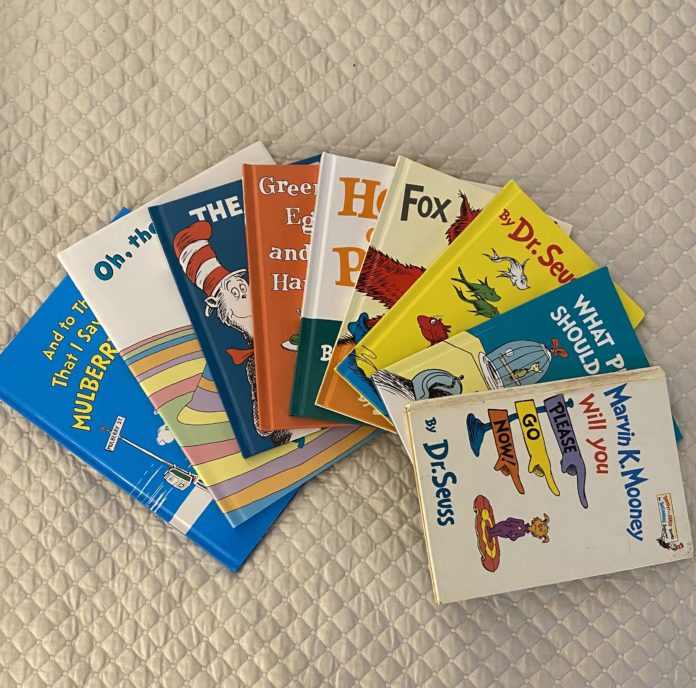Ellie Johnson
“The stereotypes in his books, back many years, that’s not what those[Asian, African-American] people are about. You can only use it as a teachable moment for fairness and equality,” Susan Hogsett, a retired elementary teacher, said.
Hogsett taught the first, second, and fifth grades at Hazel Grove and recalls growing up with the Seussical books by Theodor Seuss Geisel, who wrote and illustrated over 60 children’s books under the pseudonym of Dr. Seuss. A few of his most famous titles include, “The Cat In The Hat,” “One Fish, Two Fish, Red Fish, Blue Fish,” “Green Eggs and Ham,” “Horton Hears A Who,” and “How The Grinch Stole Christmas.”
“I can remember the first Seuss books that my parents read to me were “The Cat in the Hat” and “The Cat in the Hat Comes Back.” It made me enjoy reading. It made me want to read more books,” Hogsett said.
Recently, six of Dr. Seuss’ books have been pulled from the line up that are published by his estate, Dr. Seuss Enterprises, due to the stereotypical portrayal of different people. The company released a statement on March 2 addressing the matter.
“Dr. Seuss Enterprises, working with a panel of experts, including educators, reviewed our catalog of titles and made the decision last year to cease publication and licensing of the following titles: “And to Think That I Saw It on Mulberry Street,” “If I Ran the Zoo,” “McElligot’s Pool,” “On Beyond Zebra!” “Scrambled Eggs Super!” and “The Cat’s Quizzer.” These books portray people in ways that are hurtful and wrong,” the statement from Dr. Seuss Enterprises said.
Included in these six titles was the first book that Dr. Seuss wrote under his pen name in 1937, “And to Think That I Saw It on Mulberry Street.” The cancelation of these books has caused mass controversy to spread through the country and the media. Many claim that the cancelation was unjust since it censored the popular children’s author. Others claimed that to continue producing those titles would encourage division among people and even racism.
“Companies are allowed to sell what they want to sell, within the legal binds and expectations of the law,” Jennifer Hauck, an IB English teacher said. “I think changing our treatment of other people should be our number one priority. There are other books that Dr. Seuss has written that are not offensive.”
This does raise a question. How important is it to maintain the prominence of classic literature?
“There are so many other great children’s books out there that do a better job of representing different voices and different writers that I think it is okay for us to move on from classic literature sometimes. To me, the most responsible thing to do is to seek out those other books,” Hauck said.
However, Hogsett had a different opinion. Hogsett said that part of the problem with society today is that they are banning anything that’s negative. She believes this to have repercussions since she says history repeats itself if we choose not to acknowledge and learn from it.
“There’s always going to be a book out there or something that offends someone. You have the choice not to read that. I think we still need to remember the classics. He was raised in a time that was different. Not that it was okay, but that it was a different time.”
Trisha Carney, an English Language Arts teacher at LSW, also had a comment on the subject. “I think of it as society progressing, society realizing that in order for everybody to feel comfortable and included we have to really evaluate some of our decisions. Appreciating classic literature has its place, but so does also realizing that there are so many other literacies,” Carney said.
Carney then went on to say that while she believes that students and people should have access to any book, she doesn’t think they should be heavily promoted. “I hope that they are still available for people to read and to make their own decisions about it.”
Yet, the controversial images depicted in those six titles may be perceived as too offensive to continue to be allowed in US schools. This argument of whether the books, or even other books by Dr. Seuss, should be removed from school libraries has been at the front of the country-wide debate.
“Whenever you hand a child a book that they could potentially see as making fun of themselves or they could see as a negative light of themselves that’s problematic. I think that not just Dr. Seuss, but all books when you are giving them to a child you should consider what message you are sending,” Amy Taylor, a LSW media specialist, said.
Taylor said that removing the Dr. Seuss books may not be the best option. However, she explains that the decision to relocate or remove a book in a library should be made solely by the library in question and based on the goals of that library. Taylor also said that the age of a minor can be a factor in if the book is appropriate.
“My biggest memory, in terms of Dr. Seuss, is reading Yertle the Turtle to my sophomores when I used to teach world history. [I think] Age certainly matters. My sophomores are 15 and 16 and we can go through the nuances of those aspects or issues, where as a first grader not so much,” Taylor said.
Hogsett said that she thinks schools should not remove any of the books written or illustrated by Dr. Seuss because “when you have groups of people deciding what’s okay for people to read and what’s not okay for people to read that takes away our basic freedom of choice.”
Some are still concerned that this cancelation is censoring Dr. Seuss, but others believe that if he were alive he might have made a similar decision.
“I would say that the people he appointed to his estate would probably know his heart and know his mind and would understand that this might be something that he would have wanted, once he realized that it could have been hurtful to people,” Carney said.
“Dr. Seuss, as he was growing older, started to have some reconsiderations of his work and had he lived a hundred years or two hundred years or three hundreds years I imagine that his feelings about his work would have continually evolved,” Taylor said.
Hauck said that it was important that people understand and remember that “there are other things that we should continue to read that don’t hurt our exposure to him as a children’s writer.”
“A lot of our classic literature is not inclusive. So if we are going to be inclusive and make everybody feel comfortable sitting in the seats of the classroom then if that means classic literature takes a back seat then that’s what happens,” said Carney. “The inclusion and the comfort of our students is more important.”
The current uproar in canceling classic literature is expected to continue to progress into the next few years. However, it is hoped by many that books can adapt to include all people, but if this does not occur it’s predicted that non-inclusive literature will be inevitably taken down by society.













